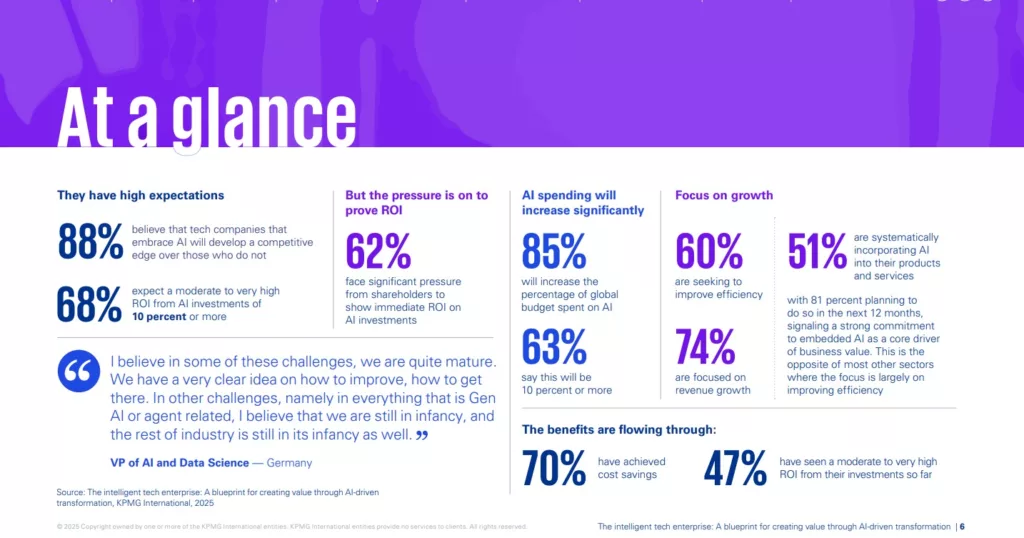KPMG International has released its latest global report titled “The Intelligent Tech Enterprise: A Blueprint for Creating Value Through AI-Driven Transformation”. The study reveals a strong belief among technology leaders in the strategic importance of artificial intelligence, with 88 percent of them stating that AI adoption is crucial for maintaining a competitive edge.

However, despite this confidence, only 47 percent of those surveyed are currently witnessing significant returns on their AI investments.
The report is based on inputs from 1,390 global executives, including 183 respondents from the technology sector. It captures their perspectives on both the promise and the challenges of AI adoption, from managing legacy infrastructure to overcoming resistance to organisational change.
KPMG also drew from its experience of handling over 500 AI-related projects with clients, leading to the formation of a three-phase blueprint — Enable, Embed, and Evolve — that outlines how technology firms can derive sustainable value from AI.
In India, the outlook is especially positive. According to the findings, 81 percent of technology companies in the country are planning to systematically integrate AI into their products and services over the next year. This indicates a shift towards becoming truly intelligent enterprises.
At the same time, 63 percent of organisations are expected to increase their AI budgets by more than 10 percent, reflecting the growing strategic importance of AI-led transformation.
While the potential for AI to redefine global competitiveness is clear, the report also stresses the importance of strong governance models, talent development and deep integration of AI into core business functions.

Technology companies are in a unique position, playing dual roles as both users and providers of AI. This gives them an early advantage, but also exposes them to new threats. Their existing business models face disruption from the rise of AI-native startups, rapidly falling software development costs, and new trends such as “service-as-software”, driven by AI agents. As a result, companies must act quickly and decisively to stay relevant.
The study points out that technology leaders are tackling multiple challenges at once. They must become proficient in applying AI to improve their own internal productivity, embed AI features into their offerings faster than their competitors, and prepare to operate in a fully AI-enabled ecosystem where customers and suppliers also rely heavily on intelligent technologies. This shift will also demand new thinking around business models and value creation.
The report further reveals that 85 percent of companies plan to increase the share of their global budget allocated to AI. While 68 percent expect a return on investment of 10 percent or more, 60 percent are focused on using AI to enhance operational efficiency. Interestingly, technology firms are also leading in the area of product innovation, with 51 percent already embedding AI into their offerings and 81 percent intending to do so in the coming year. This contrasts with other sectors, where AI adoption is mainly aimed at improving cost and efficiency.
Among the top use cases for generative AI in technology firms are performance optimisation, customer relationship management, operations execution, code generation and supply chain resource allocation. Other important areas include data governance, intelligent analytics, supply chain optimisation, quality assurance, and the use of digital assistants and automation tools.
To help companies navigate this transformation, KPMG’s report outlines five key steps to achieve success with AI. These include creating a clear AI-focused strategy, building trust through ethical frameworks, boosting the intelligence of AI-enabled products, expanding operations with modern infrastructure and data capabilities, and encouraging internal adoption to transform day-to-day business processes.
As the global technology landscape evolves, the findings from this study present a detailed roadmap for organisations aiming to stay ahead in the race to become intelligent enterprises driven by AI.


